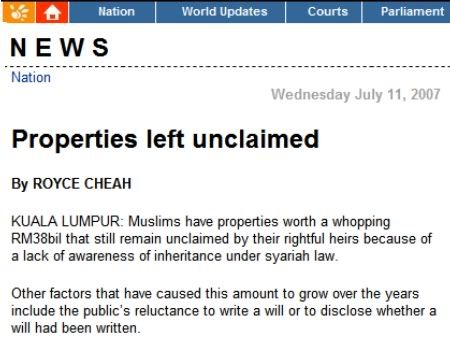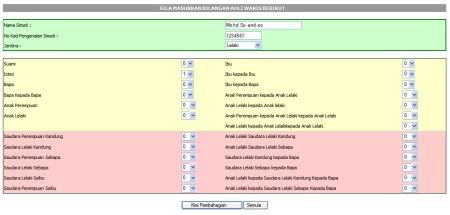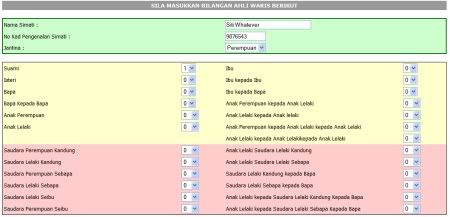Everything you wanted to know about inheritance, but were too Faraid to ask...
Technorati tags: Inheritance, Islam, Faraid, Wills, Baitul Mal
Big hat-tip to Aisehman, for getting Walski to think about this a little bit more.
Today's The Star had an article about a shitload of inheritance money, left behind by deceased Muslims, remain unclaimed. A treasure trove worth RM 38 billion (approx. USD 10.85 b), to be exact.
 RM 38b of unclaimed inheritance...
RM 38b of unclaimed inheritance...
Aisehman's concerns revolve around the possibility that any "solution" offered may involve those without a rightful claim (the long hands of Government, in particular) to get some. Valid point. Walski has similar concerns, truth be told.
Reading the article, AmanahRaya Bhd (public trustee company) group managing director, Datuk Ahmad Rodzi Pawanteh, indicated that part of the problem was that Muslims weren't aware of "inheritance under syariah law". Otherwise known as Faraid.
Among the problems quoted by the group GM include the unwillingness of Muslims to write a will or to disclose whether a will had been written.
Okay... fair enough.
But read further - the 3rd last paragraph, to be exact - and one of the possible reasons for the unwillingness becomes known immediately. Put simply, will or no will... it's better for a Muslim to give away his/her worldly property to the deserving ones in their lives before they go on to the next place... in Malaysia, at least.
(why many are possiby Faraid to leave a will, and more, in the full post)
Specifically, the article has this to say (emphasis by myAsylum):
For Muslims, the will only counts for a maximum of one-third of the value of the entire estate under Faraid law.
Say what? So what of the rest of the estate? What happens to that?
That's where the rules of Faraid come in. And what of these rules, you ask? Walski, faraid that you were gonna ask exactly that question, did a little research on this.
The basis of the prevalent faraid rules are loosely founded upon a number of verses in the Quran. Loosely, because the most important aspect of these verses have actually been de-emphasized. The most popular source quoted are three verses of a chapter in the Quran, namely Al-Nisa, verses 11, 12 and 176, which state (using the Yusuf Ali translation, emphasis by myAsylum):
11. Allah (thus) directs you as regards your Children's (Inheritance): to the male, a portion equal to that of two females: if only daughters, two or more, their share is two-thirds of the inheritance; if only one, her share is a half. For parents, a sixth share of the inheritance to each, if the deceased left children; if no children, and the parents are the (only) heirs, the mother has a third; if the deceased Left brothers (or sisters) the mother has a sixth. (The distribution in all cases ('s) after the payment of legacies and debts. Ye know not whether your parents or your children are nearest to you in benefit. These are settled portions ordained by Allah. and Allah is All-knowing, All-wise.
12. In what your wives leave, your share is a half, if they leave no child; but if they leave a child, ye get a fourth; after payment of legacies and debts. In what ye leave, their share is a fourth, if ye leave no child; but if ye leave a child, they get an eighth; after payment of legacies and debts. If the man or woman whose inheritance is in question, has left neither ascendants nor descendants, but has left a brother or a sister, each one of the two gets a sixth; but if more than two, they share in a third; after payment of legacies and debts; so that no loss is caused (to any one). Thus is it ordained by Allah. and Allah is All-knowing, Most Forbearing.
176. They ask thee for a legal decision. Say: Allah directs (thus) about those who leave no descendants or ascendants as heirs. If it is a man that dies, leaving a sister but no child, she shall have half the inheritance: If (such a deceased was) a woman, who left no child, Her brother takes her inheritance: If there are two sisters, they shall have two-thirds of the inheritance (between them): if there are brothers and sisters, (they share), the male having twice the share of the female. Thus doth Allah make clear to you (His law), lest ye err. And Allah hath knowledge of all things.
What usually doesn't get quoted are the following verses, from Al-Baqarah, verses 180 and 181:
180. It is prescribed, when death approaches any of you, if he leave any goods that he make a bequest to parents and next of kin, according to reasonable usage; this is due from the Allah.fearing.
181. If anyone changes the bequest after hearing it, the guilt shall be on those who make the change. For Allah hears and knows (All things).
It takes no stretch of the imagination to realize that "bequest" and "legacies" referred to in the verses above refer to wills written by the soon-to-be deceased. The latter two versesNow, the next question you'll probably ask: where in these verses does it mention the one-third limitation of the validity of the will?
And Walski, unfortunately, is faraid he cannot answer that question. Ask your learned ulama. Then come back and tell Walski, 'cause he sure as hell wants to know.
Incidentally, the folks at the Universiti Sains Malaysia (USM) Math department have created an inheritance calculator - go to this site, and select the "Pengiraan" button on the left. Put in a name and IC number (any name and IC number - doesn't need to be real information), and the sex of the person, followed by choosing how many people the hypothetical person would leave behind and what category they fall in. Once you've done all that, click on the "Kira Pembahagian" button towards the bottom of the page.
For the heck of it, Walski tried a couple of test case (the screenshots have been edited for clarity). Using a fictitious Mohd So-and-so as the test subject, let's assume that all he leaves behind is a wife.
 The hypothetical Mohd So-and-so leaves a wife behind...
The hypothetical Mohd So-and-so leaves a wife behind...
Assuming the calculator is accurate, the wife, by the glorious Malaysian faraid laws, gets a whopping one-quarter of the estate. The rest, goes to Baitul Mal, which is the Malaysian Islamic Charity Fund.
 ... but the wife is only entitled one quarter of the estate
... but the wife is only entitled one quarter of the estate
Let's try another test case, this time with Siti Whatever as the deceased, and having no kids, leaves behind a husband.
 But if the hypothetical Siti Whatever passes on...
But if the hypothetical Siti Whatever passes on...
 ... the hypothetical hubby gets half!
... the hypothetical hubby gets half!
Gee... hubby gets half. Again, the other half going to Baitul Mal.
So really, looking at it, the biggest loser in the unclaimed booty business is probably Baitul Mal, and not the rightful receipients. Aisehman, what seh you? Fair, or something terribly wrong with this picture?
Walski's not implying that a portion of the estate shouldn't go to charity, and he's all for the soon-to-be dearly departed to will whatever they see fit to Baitul Mal or other deserving charities of their liking. The question here is what's the use of leaving a will in the first place, if you only get to decide where one-third of it goes? And let's not even get started on the issue of gender equality in this regard.
So, boys and girls, Walski's advice, again: if you know you're going to kick it soon, dispose of what you have to those whom you feel deserve your booty. But don't forget to leave some to charity, too.
If all this offends any of you Muslims out there, please do get offended. It's your right. While you get pissed off and all, though, do also ask your resident expert ulama why the Malaysian faraid laws are the way they are, and what justifications have been used to have them that way. Take note of their answer, and see just what percentage actually comes from the Quran. Then come back and report to Walski.
Where there's a will, there's always Baitul Mal waiting for a portion of the two-thirds...
















